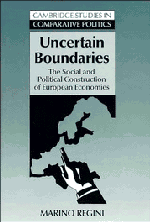Book contents
- Frontmatter
- Contents
- Preface
- Acknowledgements
- Introduction: the shifting boundaries between market, politics and society
- PART I THE RISE AND DECLINE OF THE POLITICAL REGULATION OF THE ECONOMY
- PART II THE MICRO-SOCIAL REGULATION OF ECONOMIC ADJUSTMENT
- Conclusion: the uncertain boundaries between macro and micro – the production of collective goods in the European economies
- Notes
- References
- Index
PART I - THE RISE AND DECLINE OF THE POLITICAL REGULATION OF THE ECONOMY
Published online by Cambridge University Press: 26 May 2010
- Frontmatter
- Contents
- Preface
- Acknowledgements
- Introduction: the shifting boundaries between market, politics and society
- PART I THE RISE AND DECLINE OF THE POLITICAL REGULATION OF THE ECONOMY
- PART II THE MICRO-SOCIAL REGULATION OF ECONOMIC ADJUSTMENT
- Conclusion: the uncertain boundaries between macro and micro – the production of collective goods in the European economies
- Notes
- References
- Index
Summary
In contemporary Western economies, the principal institution regulating economic activities is the market. According to the traditional view, the liberal state should refrain from intervening in the economy. Consequently, a sharp distinction should be drawn between the tasks and spheres of action pertaining to the market (chief institution of the economic system) and those pertaining to the state (the paramount institution of the political system). Nevertheless, the history of this century has been marked by constant shifts, spillovers and blurring of this traditional distinction, mainly because of two enduring phenomena.
On the one hand, increasing intervention by the state in the economy (which I examine in Chapter 1) has led to a marked expansion of political regulation and a corresponding decline in regulation by the market, an expansion which has only recently come to a halt, to differing extents in different countries. On the other, there has been a manifest tendency for the distribution of the resources produced or allocated by the state to take place according to criteria of exchange and private appropriation, and not according to administrative rationality geared to the public interest. The development of large interest organizations and political exchange (which I examine in Chapters 2 and 3) is an integral part of this process.
This redrawing of the boundaries between economy, politics and society has to some extent been the unintended outcome of multiple small shifts in the roles traditionally performed by state, market and organized social interests.
- Type
- Chapter
- Information
- Uncertain BoundariesThe Social and Political Construction of European Economies, pp. 9 - 10Publisher: Cambridge University PressPrint publication year: 1995



